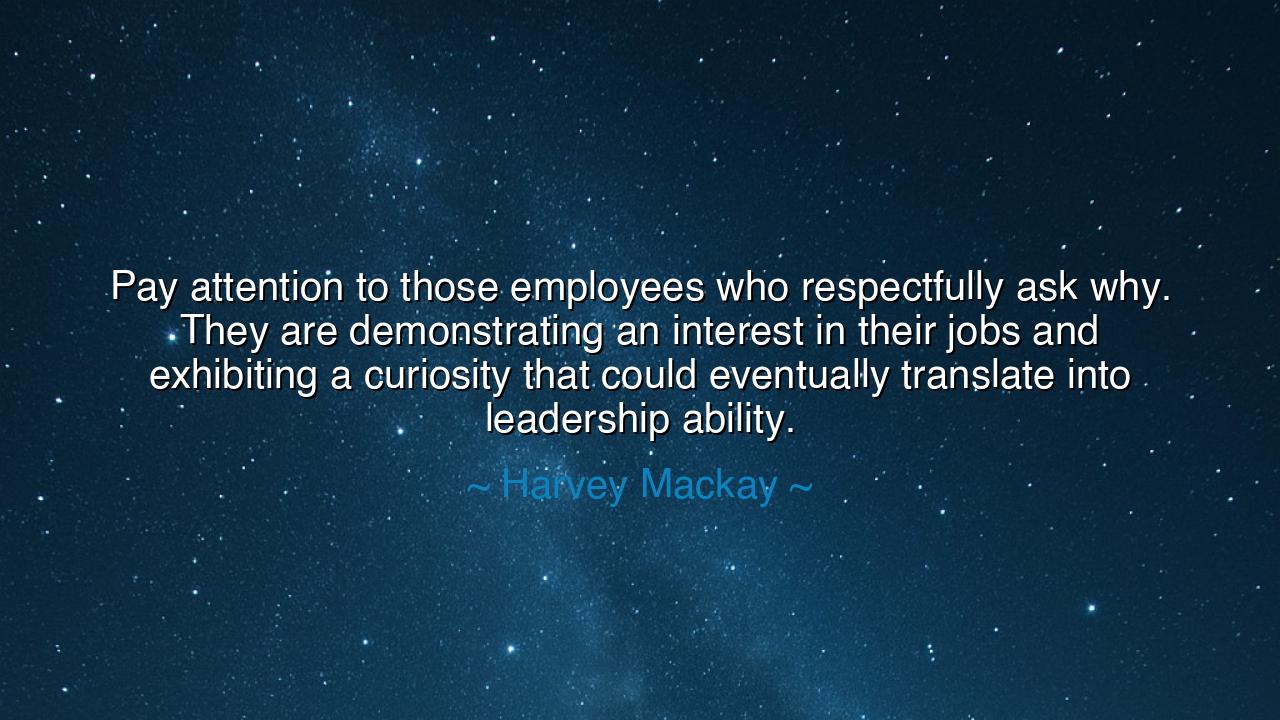
Pay attention to those employees who respectfully ask why. They
Pay attention to those employees who respectfully ask why. They are demonstrating an interest in their jobs and exhibiting a curiosity that could eventually translate into leadership ability.






Harvey Mackay, a voice of wisdom in the world of commerce and human endeavor, once declared: “Pay attention to those employees who respectfully ask why. They are demonstrating an interest in their jobs and exhibiting a curiosity that could eventually translate into leadership ability.” In these words, he calls upon us to look beyond obedience and routine, to see the spark of greatness in those who question not to defy, but to understand. For it is in the asking of “why” that one begins the journey from follower to leader, from mere participant to visionary.
The origin of these words lies in Mackay’s long experience as a businessman, author, and mentor. He had seen many workers pass through companies, some content to follow orders blindly, others dissatisfied and rebellious. But the ones who caught his eye, the ones who promised a future of leadership, were those who questioned respectfully. These were the souls who cared enough about their work to understand its purpose, its reason, its larger impact. In their curiosity, he saw the seed of responsibility, the ability to improve not only themselves but the organizations they served.
History offers many shining examples of this truth. Consider the young Alexander Hamilton, who as a clerk on the island of St. Croix, constantly asked “why” about trade, economics, and governance. His curiosity led him beyond the ledgers he kept, until he grew into one of the foremost architects of America’s financial system. Or recall young Albert Einstein, who as a child in school refused to accept formulas without understanding their meaning. His simple yet relentless questions—Why does light behave this way? Why is the sky blue?—shattered the boundaries of physics and opened new horizons of knowledge. Both men remind us that respectful questioning is not rebellion but the first breath of greatness.
The deeper meaning of Mackay’s teaching is that curiosity is not a nuisance, but a gift. Too often in workplaces and schools, the question “why” is silenced in favor of speed, efficiency, or authority. Yet when leaders discourage questions, they suffocate innovation. It is the worker who seeks to understand who later finds ways to improve. It is the student who asks “why” who grows into the teacher of others. And it is the employee who refuses to settle for blind routine who one day shoulders the mantle of leadership.
Yet there is a key word in Mackay’s counsel: respectfully. To question without respect is arrogance, but to question with humility is wisdom. The true future leader is not one who undermines authority for pride’s sake, but one who seeks truth for the sake of the team, the mission, and the greater good. Such questioning is a sign not of rebellion, but of loyalty—of caring enough to seek the best path forward. It is this balance of respect and curiosity that marks the difference between a critic who destroys and a leader who builds.
The lesson for us is clear: encourage questions, both in yourself and in others. If you lead, welcome those who ask “why” with sincerity, for they may become the pillars of your organization’s future. If you serve, do not fear to ask “why,” but ask with humility and respect, seeking not to challenge pride but to uncover truth. In this exchange, both the leader and the follower grow, and the organization is strengthened.
Practical action is close at hand. If you are an employee, let your curiosity lead you to deeper understanding of your role, and ask questions that serve the greater purpose of your work. If you are a manager or teacher, reward respectful questioning with patience and guidance, knowing you are cultivating the next generation of leaders. And in your own heart, never silence the eternal question “why,” for it is the voice of growth, the call of discovery, the pathway to wisdom.
Thus Harvey Mackay’s words endure as a torch for all who labor and all who lead: the one who asks “why” may one day answer the greater question of “how”—how to guide, how to inspire, how to shape the destiny of others. Let us therefore listen to such voices with care, for in their curiosity we may glimpse the future of leadership itself.






AAdministratorAdministrator
Welcome, honored guests. Please leave a comment, we will respond soon